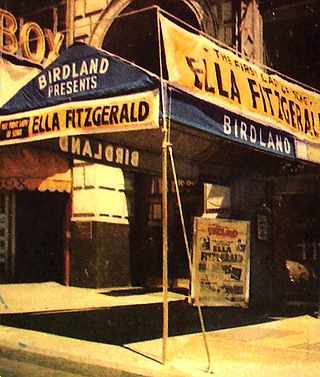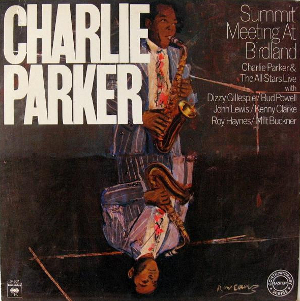
Bebop or bop is a style of jazz developed in the early to mid-1940s in the United States. The style features compositions characterized by a fast tempo, complex chord progressions with rapid chord changes and numerous changes of key, instrumental virtuosity, and improvisation based on a combination of harmonic structure, the use of scales and occasional references to the melody.
Leo Wright was an American jazz musician who played alto saxophone, flute and clarinet. He played with Booker Ervin, Charles Mingus, John Hardee, Kenny Burrell, Johnny Coles, Blue Mitchell and Dizzy Gillespie in the late 1950s, early 1960s and in the late 1970s. Relocating to Europe in 1963, Wright settled in Berlin and later Vienna. During this time he performed and recorded primarily in Europe, using European musicians or fellow American expatriates, such as Kenny Clarke and Art Farmer. He died of a heart attack in 1991 at the age of 57.

Theodore "Fats" Navarro was an American jazz trumpet player and a pioneer of the bebop style of jazz improvisation in the 1940s. A native of Key West, Florida, he toured with big bands before achieving fame as a bebop trumpeter in New York. Following a series of studio sessions with leading bebop figures including Tadd Dameron, Bud Powell, and Kenny Clarke, he became ill with tuberculosis and died at the age of 26. Despite the short duration of his career, he had a strong stylistic influence on trumpet players who rose to fame in later decades, including Clifford Brown and Lee Morgan.

Jazz at Massey Hall is a live jazz album recorded on 15 May 1953 at Massey Hall in Toronto, Canada. Credited to "the Quintet", the group was composed of five leading "modern" players of the day: Dizzy Gillespie, Charlie Parker, Bud Powell, Charles Mingus, and Max Roach. It was the only time that the five musicians recorded together as a unit, and it was the last recorded meeting of Parker and Gillespie.

Birdland is a jazz club started in New York City on December 15, 1949. The original Birdland, which was located at 1678 Broadway, just north of West 52nd Street in Manhattan, was closed in 1965 due to increased rents, but it re-opened for one night in 1979. A revival began in 1986 with the opening of the second nightclub by the same name that is now located in Manhattan's Theater District, not far from the original nightclub's location. The current location is in the same building as the previous headquarters of The New York Observer.

This is a list of recordings by American jazz alto saxophonist Charlie Parker ("Bird"). Parker primarily recorded for three labels: Savoy, Dial, and Verve. His work with these labels has been chronicled in box sets. Charlie Parker's Savoy and Dial Sessions have been issued on The Complete Savoy Sessions, Charlie Parker on Dial and Complete Charlie Parker on Dial and The Complete Savoy & Dial Master Takes. His Verve recordings are available on Bird: The Complete Charlie Parker on Verve and The Complete Verve Master Takes.

Charles Thomas Potter was an American jazz double bass player, best known for having been a member of Charlie Parker's "classic quintet", with Miles Davis, between 1947 and 1950.
"Ko-Ko" is a 1945 bebop recording composed by Charlie Parker. The original recorded version lists Parker on alto saxophone with trumpeter Miles Davis, double bassist Curley Russell and drummer Max Roach. Due to the absence of Bud Powell, Dizzy Gillespie was enlisted to play piano, instead of his usual trumpet. Pianist Sadik Hakim, then known as Argonne Thornton, was also known to be present at the session. Rumors persist to this day about precisely who played trumpet and piano on this piece; some claim it's young Miles Davis who plays trumpet and Gillespie comping at piano, on both takes; most claim Gillespie plays trumpet and, or instead of, piano; some claim Hakim is the pianist on all or part of one or both of the takes. However, Miles Davis confirms in his autobiography that he did not play trumpet on "Ko Ko":
"I remember Bird wanting me to play "Ko-Ko," a tune that was based on the changes of "Cherokee." Now Bird knew I was having trouble playing "Cherokee" back then. So when he said that that was the tune he wanted me to play, I just said no, I wasn't going to do it. That's why Dizzy's playing trumpet on "Ko-Ko," "Warmin' up a Riff," and "Meandering" on Charlie Parker’s Reboppers, because I wasn't going to get out there and embarrass myself. I didn't really think I was ready to play tunes at the tempo of "Cherokee" and I didn't make no bones about it."

Conception is a compilation album issued by Prestige Records in 1956 as PRLP 7013, featuring Miles Davis on a number of tracks. The album, compiled from earlier 10 inch LPs, or as 78rpm singles, also features musicians such as Lee Konitz, Sonny Rollins, Stan Getz, Gerry Mulligan, and Zoot Sims. The cover was designed by Bob Parent. In particular, the entirety of the 10"LP Lee Konitz: The New Sounds makes up all of side 1.
The Metronome All-Stars were a collection of jazz musicians assembled for studio recordings by Metronome Magazine, based on its readers' polls. The studio sessions were held in the years 1939–42, 1946–53, and 1956, and typically consisted of two tracks which allowed each participant a chance to solo for one chorus. Earlier recordings feature more swing style, while the later sessions tend more toward bebop.

Charlie Parker on Dial: The Complete Sessions is a 1993 four-disc box set collecting jazz saxophonist and composer Charlie Parker's 1940s recordings for Dial Records. The box set, released by the English label Spotlite Records, assembled into a single package the multi-volume compilation albums the label had released by Spotlite on vinyl in the 1970s under the series title Charlie Parker on Dial. The box set has been critically well received. In 1996, a different box set collecting Parker's work with Dial was assembled by Jazz Classics and released as Complete Charlie Parker on Dial.
"Billie's Bounce" is a jazz composition written in 1945 by Charlie Parker in the form of a 12 bar F blues. Some sources claim that the song was dedicated to Dizzy Gillespie's agent, Billy Shaw, although according to Ross Russell, Shaw's "name was misspelled" accidentally. However, others claim that the song was in fact dedicated to Shaw's secretary, who was called Billie. The original recording by Charlie Parker and His Re-Boppers was inducted into the Grammy Hall of Fame in 2002.

Dizzy Gillespie and the Double Six of Paris is a 1963 studio album collaboration between Dizzy Gillespie and Les Double Six, also known as the Double Six of Paris, a French vocal group who sings in vocalese to songs associated with Dizzy Gillespie. Gillespie, pianist Bud Powell, and a rhythm section accompany; two of the songs feature his quintet, with James Moody. It was reissued on CD in 1989.

The Essential Miles Davis is a 2-CD compilation album by Miles Davis released by Columbia Legacy on May 15, 2001. It belongs to Sony Music Entertainment's "The Essential" series, not to the series "Essentials", established by WEA International, and was released as part of Sony's Miles 75 Anniversary program. In 2008, The Essential Miles Davis 3.0 was released as a limited edition album featuring a bonus third disc that added five more songs to the original track list.
This article lists Charlie Parker's Savoy and Dial sessions as leader, which were recorded between 1945 and 1948.

Modern Jazz Trumpets is an album released by Prestige Records in 1951 with music by four jazz trumpeters: Fats Navarro, Dizzy Gillespie, Miles Davis and Kenny Dorham. The album was released on the 10" LP format and includes the first recordings by Davis for Prestige.
The Big Band and Jazz Hall of Fame is part of a US-based non-profit organization that began operations in 1978 and continues to the present (2022) in San Diego County, California. David Larkin is current president.

Summit Meeting at Birdland is a live album by alto saxophonist Charlie Parker recorded at Birdland in New York City in 1951 and 1953. It was released by Columbia Records in 1977.












